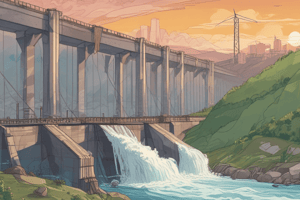Podcast
Questions and Answers
What is a advantage of hydropower in the United States?
What is a advantage of hydropower in the United States?
- Each state can generate their own electricity without having to rely on electricity sources from far away (correct)
- It requires a lot of construction materials and labor
- All states have to rely on electricity sources from far away
- It is a polluting source of energy
What is a negative impact of damming waterways on local ecosystems?
What is a negative impact of damming waterways on local ecosystems?
- Increase in temperature of the water
- Change in temperature of the water, which can disrupt ecosystems (correct)
- No impact on temperature of the water
- Decrease in temperature of the water
What is a result of the creation of a reservoir in hydropower?
What is a result of the creation of a reservoir in hydropower?
- No impact on greenhouse gases
- Production of oxygen
- Release of greenhouse gases (correct)
- Reduction of greenhouse gases
What is a problem caused by damming in hydropower?
What is a problem caused by damming in hydropower?
What is the purpose of fish ladders in hydropower?
What is the purpose of fish ladders in hydropower?
What is a benefit of using existing bridges and dams for hydropower?
What is a benefit of using existing bridges and dams for hydropower?
What is a characteristic of hydropower structures?
What is a characteristic of hydropower structures?
What is a negative impact of the decomposition of organic matter in a reservoir?
What is a negative impact of the decomposition of organic matter in a reservoir?
What is a challenge faced by organisms that rely on the natural flow of the river?
What is a challenge faced by organisms that rely on the natural flow of the river?
What is a benefit of hydropower compared to other sources of energy?
What is a benefit of hydropower compared to other sources of energy?
Flashcards are hidden until you start studying
Study Notes
What is Hydropower?
- Hydropower is the natural force created by water as it moves from areas of high elevation to areas of low elevation.
- Water produces massive amounts of kinetic energy as it flows due to the force of gravity pulling it down.
Historical Use of Hydropower
- Hydropower has been used historically to power mills that milled wheat into flour, and to power hammers that break and process ore.
- In the late 1700s and 1800s, the invention and use of the turbine led to the production of electricity using hydropower.
Hydroelectric Power
- Hydroelectric power is the production of electricity using hydropower.
- The U.S. uses hydroelectric power to produce 7.3% of its total generated electricity and 37% of its total clean energy produced.
- Hydroelectric power plants are built on rivers, and some are built with dams that create artificial bodies of stored water known as reservoirs.
Electricity Generation
- To produce electricity using water, there must be a flow of water and a turbine connected to an electrical generator.
- The water cycle is the pattern of water being evaporated, condensing into clouds, and falling back to Earth, which provides the flow of water for hydroelectric power.
- The flow of water usually comes from a river, and the hydropower plant is built right on the waterfront.
- The water flows through holes in the dam, or penstock, which then turns a turbine and powers a generator.
How Hydropower Produces Electricity
- The turbine turns a shaft connected to magnetic steel filaments that spin when the turbine turns.
- The spinning magnets cause electrons to jump from the magnet to the copper wire, producing electricity.
- The electricity is piped to the electrical grid, which our homes and buildings are connected to.
Hydropower Pros and Cons
- Pros of hydropower include:
- It is a renewable resource because water is recycled constantly in the water cycle.
- It is a clean energy resource because it does not use fossil fuels that pollute the atmosphere.
- It is flexible, meaning electricity can be produced immediately once the hydropower facility is built.
- It is cost-effective, with construction requirements that are cheap and structures that are durable.
- It provides a local power source, with each state able to generate their own electricity.
- Cons of hydropower include:
- The damming of waterways can have drastically negative impacts on local ecosystems.
- Creating reservoirs can change the temperature of the water, which can disrupt ecosystems.
- The creation of a reservoir can sometimes include practices that contribute to greenhouse gas emissions.
- Damming can disrupt the natural flow of the river, affecting many organisms that rely on the natural flow of water.
Studying That Suits You
Use AI to generate personalized quizzes and flashcards to suit your learning preferences.




